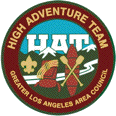 |
GLAAC-HAT Adult Training |
 |
| Home | Calendar | Training * | Awards | Store | Publications | Flyers | Links | Contact Us | |||||||||
 |
GLAAC-HAT Adult Training |
 |
| Home | Calendar | Training * | Awards | Store | Publications | Flyers | Links | Contact Us | |||||||||
Extracted from Hike Aid 3, dated February 2025.
Training is the foundation on which an enjoyable and safe outdoor program is built. Every Unit needs adult leaders who have participated in High Adventure training. The more extensive your program, the more extensive your training should be. It is truly said that there is always more to be learned. The continuous changes in equipment, techniques, rules and regulations provide ample demonstration of that.
Full Dimension High Adventure Training is conducted on a continuous basis throughout the year. Adult Leaders Backpack Training, offered in February of each year, is the basic course, providing a broad overview of hiking, camping, backpacking, conservation techniques, and equipment. Completion of this training is mandatory for the leader of a long-term backpack trip, if the Unit is to receive an outdoor award. At the first training program attended, the participant will be given a training card on which to record sessions completed.
Intensive training in specialized activities is offered during the balance of the year. Each of these training courses is self-contained, and consists of a day or evening seminar and a field experience. They may be taken in any order, although several require having completed Adult Leaders Backpack Training. Special training for other outdoor activities are offered, as the level of interest dictates.
This training is open only to registered Scouters 18 years of age and older. Each participant must have a medical examination, in compliance with National Council policy. Scouters are responsible for obtaining the personal clothing and equipment which are required for the field experiences.
Specific information about dates, locations, fees, and reservations for this training is published in The Trail Head, Scouter's News, the GLAAC-HAT web site (https://glaac-hat.org/), and the Council's web site (https://greaterlascouting.org/).
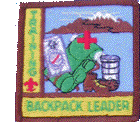
The Scouts Handbook promises each Scout an exciting, challenging, year-round program of hiking and camping. Where to begin? What to do?
The objectives of this High Adventure training are to provide the adult Scouter with a basic understanding of how to plan and conduct outdoor activities, to stimulate your participation and leadership at the Unit level, and to inform you of the many programs and activities of the GLAAC-HAT. While the emphasis is on backpacking, the training, in two parts, is generally applicable to all types of outdoor activity.
The first part, a seminar from Friday evening through mid-day Sunday is conducted as a series of discussions and demonstrations. The full range of outdoor topics, including leadership, planning and preparation, conditioning, equipment and clothing, menus and cooking, risk and safety, orienteering, route finding and mountain travel, conservation, outdoor courtesy, and long term planning, are covered. The importance of training and transferring leadership to your Scouts is stressed. High Adventure program awards are displayed and the requirements for earning them are discussed. Clothing and equipment are exhibited and demonstrated. The many forms and permits required by the agencies which administer outdoor locales are discussed and samples are provided. The importance of understanding and following the Scouting America and other agencies' rules regarding outdoor activities is stressed. Books, maps, and other materials which are needed for planning an outing are discussed. A representative of the USDA-FS typically attends, to discuss its volunteer program for forest and trail conservation.
The second part is a weekend field trip in the local mountains. You practice the skills and use the equipment which were discussed at the conference. This trip will be a backpack in the range of 5-7 miles, round trip. Each person is responsible for providing their own equipment and clothing needed for the trip.
Completion of this training earns the Scouter recognition as a Backpack Leader and the award of a special patch. Completion of this training is a requirement for earning the High Adventure Leader Award.
| Prerequisites: | As this is the introductory program to High Adventure training, there are no prerequisites to attendance other than being a currently registered adult Scouter with Scouting America. |
Fees: A nominal fee is charged. The fee covers meals, lodging, course materials, and patch.
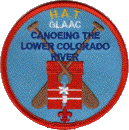
The objectives of this High Adventure training are to provide the adult Scouter with a basic understanding of how to plan and conduct a successful canoe adventure for your Troop on the Lower Colorado River.
The training is a one day course covering routes, logistics, safety, food, and hands on canoeing experience. Special equipment is like canoes paddles, drybags, lifejackets, etc. will be shown and discussed.
Completion of this training is recognized by the award of a special patch.
| Prerequisites: | It is highly recommended that participants have completed Scouting America Paddle Craft Safety and GLAAC-HAT Adult Leaders Backpack Training. |
Fees: A nominal fee is charged.
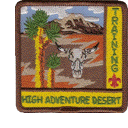
Southern California is basically a desert with a few mountain ranges scattered across it for variety. Numerous opportunities for hiking and camping in one of its three desert regions - Sonora, Mojave, and Great Basin - are literally at our doorstep.
The objectives of this High Adventure training are to provide the adult Scouter with an understanding and appreciation of the uniqueness and special qualities of the desert environment and to emphasize those backpacking skills that are essential to having a safe and enjoyable experience. This High Adventure training consists of a Saturday seminar and a weekend field trip to Joshua Tree National Park.
The seminar is conducted as a series of demonstrations and presentations. They consider the unique, harsh reality of the desert, and cover: special equipment and clothing needs; menu planning; desert travel and route finding; water requirements and conservation; safety and first aid. Equipment and other needs for vehicles which are used for outings in the desert are described.
The weekend field trip provides the opportunity to demonstrate these specific skills in the desert. This trip will be a backpack of about 5 miles, round trip, to a dry campsite. You will have the opportunity to climb a nearby peak. Each person is responsible for providing their own equipment and clothing needed for the trip.
Completion of this training is recognized by the award of a special patch. Completion of this training is a requirement for earning the High Adventure Leader Award.
| Prerequisites: | It is highly recommended that participants have completed Adult Leaders Backpack Training. |
Fees: A nominal fee is charged.

Do you feel uncomfortable about taking your Unit into a new location, especially when there may not be trails or when the trails are of unknown quality? Have you felt that your outings are too trail-bound or provide too little challenge for the older participants? The solution to both conditions is to develop/improve your navigation and route-finding skills. The Orienteering merit badge pamphlet states that "All you need is a map, a compass, curiosity, and common sense".
The objectives of this High Adventure training are to provide the adult Scouter with a thorough understanding of the use of map and compass and to introduce him/her to a variety of route-finding techniques. We use the sport of orienteering as a method to teach this important set of skills. This High Adventure training consists of a Saturday seminar and participation in a Los Angeles Orienteering Club event.
The seminar will include discussions of the tools of navigation and strategies for their utilization. There will be demonstrations of various types of maps and compasses. Topics will include route finding, collecting terrain features, the Global Positioning System (GPS), being disoriented, avoidance of getting lost, and getting "un-lost". The special problems and techniques associated with route finding on the snow and in desert terrain will be discussed. We will also discuss orienteering events; how they are run and why they are useful in route-finding and off-trail navigation. These activities will be followed by participant-led map-hikes.
The field trip will be held in association with the Los Angeles Orienteering Club. Participants will help in setting up and conducting an orienteering rally.
Completion of this training is recognized by the award of a special patch. Completion of this training is a requirement for earning the High Adventure Leader Award.
| Prerequisites: | None. |
Fees: A nominal fee is charged.

Knowledge of safe and effective techniques can open this exhilarating activity to you and your Scouts.
The objectives of this High Adventure training are to introduce the adult Scouter to the Scouting America climbing program and to the specialized skills and techniques of basic rock climbing and rope use/rescue. The Unit can experience the challenges of high-mountain travel, especially using cross-country routes, with confidence because of this training in climbing and in rope use and rescue techniques. The opportunities and requirements for being trained as a Scouting America qualified climbing instructor will be discussed. This High Adventure training consists of an evening seminar and a weekend field trip.
The seminar provides discussions and demonstrations of the special equipment and gear needed for this activity. Instructions are provided in rope handling and knot tying. Technical climbing hardware will be demonstrated. The physical demands, safety requirements, and recognition of risk is stressed. Participants will be trained in Scouting America's Climb On Safely procedure.
The weekend field trip provides the opportunity to practice these activities in Joshua Tree National Park, one of the outstanding rock-climbing areas in the country. You will be instructed in the use of rope and other gear for climbing (both belay and rappel) and in rope rescue techniques. Then you will do some climbing. You will rappel and try your hand, while on belay, at climbing a rock face. You will learn how to tie several special knots and to fashion a seat-sling from a piece of tubular webbing.
Completion of this training is recognized by the award of a special patch.
| Prerequisites: | None. |
Fees: A nominal fee is charged. Joshua Tree National Park has a per vehicle entrance fee.
Note: Persons who desire to be certified as a qualified rock-climbing instructor must complete a separate training program conducted at the local Council, National Camp School, or another Scouting America recognized source. Additional information about Climbing Instructor training may be obtained from the GLAAC Director of Camping Services or the Council's COPE/Climbing Program Trainer.

Once your Scouts have mastered the thrill of winter backpacking and snow camping, there will be no holding them back from the next rung of the High Adventure ladder. They will know no thrill greater than crossing a snowfield or peak bagging during the winter in the local mountains. However, special skills must be developed to deal safely and confidently with the snow and ice which will likely be encountered.
The objectives of this training are to introduce the adult Scouter to these skills and techniques. Your judgment will be sharpened, and your knowledge of safe and effective practices for snow slope travel will allow you to expand your list of places that you can reach in the great outdoors. This training is particularly recommended to Unit Leaders who expect to climb peaks in the Sierras while on a long-term backpack. This High Adventure training consists of an evening seminar and a one-day field trip in the local mountains.
The seminar emphasizes equipment and safe practices. Special equipment is shown and discussed. The physical demands, health and safety considerations, and navigation and route finding in this environment are reviewed.
The field trip provides the opportunity for practice in the use of crampons and the ice axe. You will learn how to use this important lifesaving device in self-belay techniques, exhilarating glissades, and for traveling on snow or ice, alone or as part of a roped, climbing team. Other specialized skills, safety practices, and equipment will be demonstrated. Each person is responsible for providing their own specialized equipment and clothing needed for the trip.
Completion of this training is recognized by the award of a special patch.
| Prerequisites: | Participants must have completed Adult Leaders Backpack Training along with Winter Camping and Travel Training. |
Fees: A nominal fee is charged.

If you are the kind of hiker who would like to take extended trips during winter months, you should try snow shoeing or cross country skiing. Enjoy the challenge of high country winter travel with confidence. Learn firsthand knowledge of safety and techniques. It will allow you to expand your "places to go" during the snow season.
Skiing - who could possibly resist its allure? Outstanding conditions for each type - downhill (Alpine), cross country (Nordic), and mountaineering - may be found each winter within 120 miles of Los Angeles. Cross country skiing, the simplest and least expensive type, is a terrific Unit activity.
The objectives of this High Adventure training are to introduce the adult Scouter to snow shoeing and cross country skiing and to promote it as a part of a Unit's winter outdoor program. This training consists of an evening seminar and two outings to the local mountains.
The seminar provides discussions and demonstrations of the special equipment and gear needed for this activity. Safe practices, the several areas in the local mountains which are suitable for snow shoeing and cross country skiing, and where to arrange for equipment and instruction are also covered.
On the first outing instruction in the basic techniques of cross country skiing is provided. Equipment use, technical moves, Ski Patrol rules, safety, and courtesy are covered. In the afternoon, you will ski a section of the groomed trail in the Mt. Pinos area. Each person is responsible for providing their own skis and other equipment.
On the second outing instruction in the basic techniques of snow shoeing is provided. Equipment use and courtesy are covered. In the afternoon, you will snow shoe in the local mountains. Each person is responsible for providing their own snow shoes and other equipment.
Completion of this training is recognized by the award of two special patches.
| Prerequisites: | None. |
Fees: A nominal fee is charged.
| Download the pdf flyer for the next spring class or for the next fall class. |
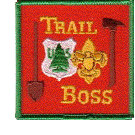
Construction and maintenance of the trails in the local mountains are, in most instances, the responsibility of the USDA-Forest Service. However, budget constraints severely limit the amount and nature of the work which it can do. Therefore, much of this effort, as well as trash pickup, habitat restoration, plantation clearing, etc., is now done by volunteers under its direction.
The objective of this training is to train and qualify adult Scouters to organize and supervise conservation projects by sponsored groups, such as a Scout Unit.
This training is conducted as a series of Saturday field exercises. Participants may begin at any time and proceed through the training to the convenience of their own schedule and interests. At the student's initial session, he/she is instructed in the proper use of tools and in the USDA-FS standards of workmanship, safety, and construction and given a training card. Subsequent instruction has the objective of developing proficiency and knowledge in determining the need for, performing, and reporting the results of, trail maintenance and construction projects.
Upon completion of this training, the Scouter has the opportunity to supervise two, six hour, Unit work projects under the guidance of the Forest Service and the GLAAC-HAT and two, six hour, work projects on their own. Satisfactory performance on these projects earns him/her recognition as a Trail Boss and the award of a special patch. When the Trail Boss oversees two more conservation projects of a minimum of six hours each in the Angeles National Forest, he/she is awarded the Trail Boss Service Pin.
All special tools and materials for this training are provided by the USDA-FS and the GLAAC-HAT. Completion of six hours of this training (one session) is a requirement for earning the High Adventure Leader Award.
| Prerequisites: | None. |
Fees: There is no charge for this training.
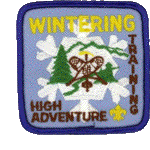
Winter brings a special stillness to the local mountains. The year-round camper knows that the pests of summer - insects, small animals, other people - have gone to ground for the season. While the snowy peaks may appear close and inviting, that same camper also knows that the weather and trail conditions require special preparation, skills, and equipment.
The objectives of this training are to provide the adult Scouter with an understanding of the winter environment and to emphasize those backpacking skills which are necessary to ensure a safe and enjoyable outing. This High Adventure training consists of a Saturday seminar and a weekend field trip in the local mountains.
The seminar is conducted as a series of presentations and demonstrations. The emphasis is on preparing for, and dealing with, a mountainous winter environment, be it rain, cold, snow, or some combination. Equipment and clothing necessary for these conditions are demonstrated. Sessions cover: the physical demands of winter conditions; snow travel hazards and equipment needs; health and safety; navigation and route finding; menus; food and water needs; and personal clothing and equipment. The desirability of having a "Plan B" and the necessity of providing for unexpected changes in the weather or trail conditions are explained.
The weekend field trip provides the opportunity to demonstrate these specific skills in a winter environment. This trip will be a backpack of about 5 miles, round trip, in the local mountains under snow conditions. Snowshoes will be worn while backpacking. Each person is responsible for obtaining the specialized equipment and clothing needed for the trip.
Completion of this training is recognized by the award of a special patch. Completion of this training is a requirement for earning the High Adventure Leader Award.
| Prerequisites: | Participantsmust have completed Adult Leaders Backpack Training or have backpacking experience acceptable to the Course Director. |
Fees: A nominal fee is charged.
|
Download the pdf flyer for the next spring class or for the next fall class. Register online for this class. |
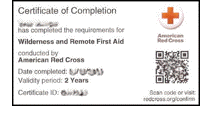
Scouts at least age 14 can take Wilderness and Remote First Aid.
Wilderness and Remote First Aid (WRFA) is the assessment of and treatment given to an ill or injured person in a remote environment where definitive care by a physician and/or rapid transport is not readily available. This course goes far beyond what you may know as "first aid". While it contains substantial medical information and teaches skills required for medical emergencies in the wild, the deeper purpose is to train participants to manage acute situations.
Designed for youth and adult Scout leaders and anyone who works or spends time in remote environments, this course teaches advanced skills to be used in emergencies when help from professional first responders may be far away. Scouts and Scout leaders will likely find this the most valuable program they'll ever take.
WRFA is based on Scouting America's Wilderness First Aid Curriculum and Doctrine Guidelines (including Philmont and the other High Adventure Bases).
Completion of this training provides a two year certification through the American Red Cross or the Emergency Care and Safety Institute. Completion of this training is a requirement for earning the High Adventure Leader Award.
| Prerequisites: | Participants must be at least 14 years old, hold current adult CPR/AED certification and online trainings in Weather Hazards, Safe Swim Defense and Safety Afloat. |
Fees: A nominal fee is charged.
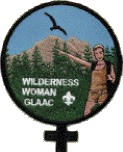
This is a 4-hour course for women and girls of all ages in Scouting to help be comfortable and excited to enjoy trails and the outdoors. The intention of this course is to create more freedom amongst adults and Scouts to discuss personal issues; therefore, this is a single-gender-only course for women and girls. *
In this course, a group of women and girl Scouters lead a group discussion across a full range of topics, questions, challenges and experiences related to women and girls in the wilderness. We discuss everything from practicalities of group dynamics, YPT, leadership, invisible barriers, the nuts and bolts of going to the bathroom, hygiene, menstruation, leadership, Leave No Trace, what to pack, and what to leave behind. We provide a woman-centric perspective on planning, selecting and using gear for different circumstances.
Bring your questions, your curiosities, your worries, and your experiences. This is your chance to ask those things you might not know how to ask. We will trade experiences, and you'll head out with more ideas for your trips with your troop and family. No question too big, no question too small! Youth are welcome to attend with a related female adult.
Note: This seminar is not intended to cover the full spectrum of backpack training. We recommend that female leaders attend the Adult Leaders Backpack Training course after Wilderness Woman.
Completion of this training is recognized by the award of a special patch.
| Prerequisites: | Female-only. * |
Fees: A nominal fee is charged. The fee covers a continental breakfast and course materials.
| * | Exception to single-gender rule: Trans Scouts may attend whichever course they prefer. We ask nonbinary Scouts to attend the course that's correlated to their sex. Please reach out to the course leader to chat more about the differences in the courses if you have questions. |
This is a 4-hour course for men and boys of all ages in Scouting to help be comfortable and excited to enjoy trails and the outdoors. The intention of this course is to create more freedom amongst adults and Scouts to discuss personal issues; therefore, this is a single-gender-only course for adult male Scouts. *
In this course, a group of women and girl Scouters lead a group discussion across a full range of topics, questions, challenges and experiences related to women and girls in the wilderness. We discuss everything from practicalities of mixed-gender group dynamics, YPT, leadership, and possible invisible barriers. We also go through the practical logistics of how we handle menstruation, going to the bathroom, and hygiene in the outdoors. We will cover nuts and bolts of menstrual supplies, urination devices, etc. so you can have an idea of what may be involved if you have a menstruating participant on a trip.
Bring your questions, your curiosities, your worries, and your experiences. This is your chance to ask those things you might not know how to ask. We will trade experiences, and you'll head out with more ideas for your trips with your troop and family. No question too big, no question too small!
| Prerequisites: | Male-only. * |
Fees: A nominal fee is charged. The fee covers course materials.
| * | Exception to single-gender rule: Trans Scouts may attend whichever course they prefer. We ask nonbinary Scouts to attend the course that's correlated to their sex. Please reach out to the course leader to chat more about the differences in the courses if you have questions. |